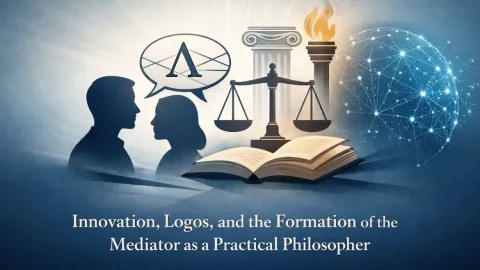From Delay to Resolution: Can India's Mediation Act Inspire U.S. Reforms?
August 1, 2025
Introduction
Mediation as an alternative to litigation offers a time-saving, cost-effective, and flexible process that helps avoid the prolonged and burdensome procedure of traditional court litigation. Since mediation is based on mutual consent and grounded in self-determination, one would assume that the execution of a mediated settlement agreement (“MSA”) would be straightforward. However, this idealised view of mediation does not always translate into reality, particularly when enforcement mechanisms are weak and susceptible to procedural delays.
The effectiveness of mediation hinges on the ability to enforce MSAs in a timely and predictable manner. However, in jurisdictions like the U.S. where MSAs are treated as contracts rather than court decrees, enforcement often turns into a long-drawn legal battle, undermining the very purpose of mediation. This article critically examines these challenges and argues that India’s Mediation Act of 2023 offers valuable insights and a strong framework that U.S. legislators could adopt to enhance their mediation laws.
Enforcement challenges in the U.S.
In the U.S. MSAs are treated as contracts and can be challenged under contract law defences such as duress, coercion, fraud, undue influence, misrepresentation, and mutual mistake. The application of a contractual status to an MSA has created an enforcement loophole, allowing parties to exploit defences to delay compliance.
Disputes about enforcement of MSAs remain the most litigated topic in the U.S. Such disputes constituted nearly 50% of all mediation-related cases from 1999 to 2003 and approximately 40% from 2013 to 2017. These statistics reveal a troubling paradox: mediation, intended to provide an efficient alternative to litigation, is becoming increasingly entangled in protracted court proceedings.
A recent case, Dozier v. Scruggs, (2024) highlights systemic flaws in the U.S. Mediation framework. In this case, the dispute over the enforcement of an MSA lasted more than six years after the mediation agreement was concluded.
Timeline of the case
1. After concluding an MSA in November 2019, the defendant failed to fulfil their obligations under the agreement.
2. The plaintiff filed a motion for sanctions due to non-compliance in June 2020, which was denied by the trial court.
3. In December 2022, the plaintiff filed another motion—this time seeking enforcement of the MSA and entry of judgment against the defendant. This too was denied—three years after the agreement was signed.
4. By 2024, the plaintiff filed an appeal seeking the execution of the MSA. In response, the defendants challenged its validity and enforceability under contract law. The court, therefore, examined whether the agreement met the essential requirements of a firm and definite contract and whether it was legally binding. Ultimately, the case was remanded to the trial court for enforcement.
What is particularly striking is the extraordinary delay in execution—the MSA was signed in 2019, yet more than five years later, it still had not been enforced.
Critical issues highlighted by the case
1. This case underscores how enforcement delays significantly undermine the efficiency of mediation. If parties must return to court six years after settling a dispute to validate enforceability, the very purpose of mediation as an alternative to litigation is defeated.
2. By treating such agreements as contracts and allowing challenges on multiple contract law defences, parties often misuse the system to evade their obligations. Statistics further substantiate this observation. In 69% of cases from 2013 to 2017, courts ultimately rejected contractual defences and enforced the MSAs, highlighting how these defences are more often than not meritless and are frequently raised to delay enforcement.
3. The contractual nature of an MSA often leads parties to take compliance lightly. Unlike court judgments or arbitral awards, which carry statutory backing and enforcement tools—including contempt of court penalties—MSAs typically lack these coercive enforcement mechanisms. When a party breaches an MSA, the only recourse to it, is to file a breach of contract claim, seeking either damages or specific performance—both of which are costly and time-consuming. This loophole incentivizes parties to disregard their obligations, diminishing the authority of MSAs and discouraging or delaying compliance.
India’s Mediation Act of 2023: a model for reform
In contrast, India’s Mediation Act of 2023 provides a robust framework that strengthens enforcement mechanisms, ensuring that mediation delivers on its promise of efficiency and finality, catering to the aforementioned issues.
The key provisions for enforcement of MSAs are enshrined under Chapter VI of Mediation Act 2023, titled as “Enforcement of Mediated Settlement Agreement”.
Section 27 of the Act titled, “Recognition and Enforcement of Mediated Settlement” states that an MSA signed by the parties and authenticated by the mediator shall be final and binding on the parties. Moreover, it further states that it shall be,
“enforced in accordance with the provisions of the Code of Civil Procedure, 1908, in the same manner as if it were a judgment or decree passed by a court”.
Thus, Section 27 holds that an MSA will be final, and its form will be like a court decree, distinguishing it from a contract, as seen in U.S. jurisprudence.
Moreover, Section 28 of the Act titled, “Limited grounds for challenging mediated settlements” lists specific grounds and procedures for challenging an MSA. It states that an MSA may be challenged on the grounds of — “(i) fraud; (ii) corruption; (iii) impersonation; or (iv) where the mediation was conducted in disputes or matters not fit for mediation under section 6.”
Furthermore, Section 28(3) imposes strict timelines for raising challenges —90 days from receipt of the MSA, extendable by another 90 days upon showing sufficient cause. Once this period expires, enforcement begins immediately, ensuring swift resolution.
Thus, by treating MSAs as court decrees and limiting the scope for contractual challenges, India’s framework significantly reduces the scope for enforcement disputes.
Lessons for the U.S.
The key weaknesses in the U.S. mediation system—lengthy enforcement delays, excessive litigation over MSA validity, and weak compliance incentives—are directly addressed by the Indian model.
1. Enforcement as a Decree
The U.S. could adopt a system where MSAs, once concluded, receive statutory backing as court decrees. This would deter non-compliance by imposing legal consequences, such as contempt of court penalties, reinforcing the authority of MSAs.
2. Limiting grounds for challenge
By taking inspiration from India’s Section 28, the U.S. could restrict the grounds for challenging an MSA to exceptional cases, thereby reducing meritless litigation. This would ensure greater efficiency and predictability in mediation outcomes.
To conclude, India’s Mediation Act of 2023 provides a compelling roadmap for addressing enforcement challenges in the U.S. mediation system. If the U.S. were to adopt similar reforms, it could significantly reduce mediation-related litigation and enhance the credibility and finality of MSAs. In doing so, it would reaffirm mediation’s core objectives—efficiency, cost-effectiveness, and the swift resolution of disputes—ensuring that MSAs fulfil their promise of finality and justice.
You may also like










Paul Sills
Editorial Comment: Do Mediated Settlement Agreements Deserve a “Special Place” in Enforcement Regimes? Akanksha Oak’s thoughtful article raises a fundamental question about the durability of mediated settlement agreements (MSAs): Are they worth more than the paper they’re written on? While we rightly celebrate mediation as a flexible, efficient, and consensual process, the value of any MSA ultimately lies in its enforceability. When that value is undermined—by delay, uncertainty, or misuse of legal loopholes—trust in the entire mediation process is at risk. The Dozier v. Scruggs case illustrates this starkly: a six-year battle to enforce an MSA runs counter to the very purpose of mediation. Such outcomes frustrate parties, drain resources, and deter future users. This is not a quirk of the U.S. system alone; enforcement challenges are a global concern. But the contrast with India’s 2023 Mediation Act is striking. By elevating MSAs to the status of court decrees and sharply limiting the grounds for challenge, India offers an example of what it might mean to give mediated outcomes a “special place” within the legal system. Should more jurisdictions follow suit? Should MSAs be treated, as they are under the Singapore Convention and India’s Mediation Act, as outcomes worthy of expedited and binding enforcement—distinct from ordinary contracts? There are, of course, counterarguments. Some may worry about over-formalising mediation, or about restricting legitimate recourse for parties who allege misconduct during the mediation process. Yet, these concerns must be weighed against the increasing evidence that the current patchwork of enforcement rules—especially where MSAs are treated no differently than any other contract—invites delay and undermines confidence. Many practitioners report that the vast majority of mediated agreements are in fact honoured voluntarily, without litigation. But what about the outliers? What is your experience when things go wrong? We invite our readers to share their views: Do you believe MSAs should receive more robust and streamlined enforcement treatment? Have you encountered difficulties enforcing an MSA in your jurisdiction? Does the model proposed in India’s legislation or the Singapore Convention on Mediation reflect the kind of reform needed elsewhere? Or is the current contract-based approach sufficient if supported by good process design? We welcome your perspectives and practical insights. After all, the legitimacy of mediation as a reliable pathway to resolution may well depend on how we treat its outcomes when parties don’t voluntarily comply.
Paul Mason
The Singapore Convention on Mediation (2019), is designed to resolve this very problem for international commercial mediation settlement agreements. The number of signatory states is significant, with ratifications also growing.